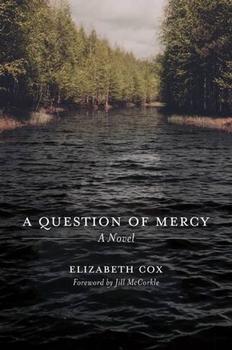Summary | Excerpt | Reading Guide | Reviews | Beyond the Book | Readalikes | Genres & Themes | Author Bio

 Book Reviewed by:
Book Reviewed by:
Rory L. Aronsky
Buy This Book
Chapter 7
On the day Adam was born, Calder Finney passed out cigars like a carnival barker. He bragged to everybody that Adam weighed eight pounds, four ounces. He told complete strangers.
Clementine had lost her first baby (also a boy) when the umbilical cord wrapped around the neck of the fetus. The baby died only a few minutes after birth; but the birth of Adam was long and arduous until, finally, the doctor used forceps to pull him out and Adam's head, for a few days, was misshapen. Nobody mentioned brain damage at the time.
Adam was a beautiful child, with long lashes and a mop of dark hair. During those early years, Calder took him everywhere; but as Adam's lack of progression grew evident, Clementine took him back to the clinic where he was born.
A doctor suggested that Adam be tested and have some X-rays. Adam was three. They stayed several days in a motel, and both Clementine and Calder went with Adam to everything, pretending it was all a kind of game. On the third day the doctor said that they had found some brain damage. "A subdural hemorrhage—probably at birth, or maybe even before." He said that Adam would always have the mind of a child. He could never live independently. Another doctor urged Calder to make financial plans for Adam, so that he would be cared for if something happened to them. But Calder refused to admit that Adam wasn't going to be a normal boy. He continued to take him fishing and to ball games. He even coached a Little League team, and let Adam play.
For six years they struggled to teach Adam how to walk and talk, how to drink from a cup, and eat with utensils; and though Adam achieved some success, the learning curve had been steep. When Calder coached the Little League team, he worked every day that summer teaching Adam to hit the ball, catch, and throw.
"Look, he can run. Clementine, you're worrying for nothing. He'll do fine in school. You wait and see. He loves for me to read books to him." "Calder, he doesn't understand what you're reading."
"You don't know that."
But Clementine did know. Adam's body was developing into a healthy specimen, but his mind lagged behind; and though he entered the first grade in September of his sixth year, he attended for only one term.
The first grade teacher taught the children about rivers (with turtles, catfish, and bluefish) and about oceans (with whales, sharks, starfish, and crabs). That fall Adam began to dream about the sea. He imagined he could live on the ocean floor, put on his socks and shoes, and run around underwater, chase bluefish and turtles—make them do tricks like a dog. He believed that someday the ocean would live inside him, inside his head and arms and legs. He thought he could grow into that bigness. He had dreamed it. When Clementine said, "No, it's not like that," Adam insisted that he could swallow the ocean whole, eat it like a cookie—all the fishes and conchs, all the starfish and tiny shells. He knew that rivers went to the sea. He thought his dreams were true.
When Adam came home talking about ocean life and fish that lived in rivers, Calder grew hopeful, even excited. "See? I told you. He's getting the hang of it." But the hopefulness was brief. By the middle of the semester, the teacher, as well as the principal, reiterated what the doctors had told them years earlier. Only then, did Calder accept the truth.
Christmas that year came and went, and Calder moved around the house like a ghost. Just before the New Year began, he explained to Clementine that he could no longer live in the house.
"You're leaving us?" Clementine panicked.
"I can't do this," he said. He didn't know what else to say. "I've left enough money in the bank for three months, and I'll send checks to be deposited every month. I'll take care of you both. I've found a job . . . " He stopped. Calder had worked for a company selling sports equipment to schools. He was successful and could find work easily.
Excerpted from A Question of Mercy by Elizabeth Cox. Copyright © 2016 by Elizabeth Cox. Excerpted by permission of Story River Books. All rights reserved. No part of this excerpt may be reproduced or reprinted without permission in writing from the publisher.




It is among the commonplaces of education that we often first cut off the living root and then try to replace its ...
Click Here to find out who said this, as well as discovering other famous literary quotes!
Your guide toexceptional books
BookBrowse seeks out and recommends the best in contemporary fiction and nonfiction—books that not only engage and entertain but also deepen our understanding of ourselves and the world around us.